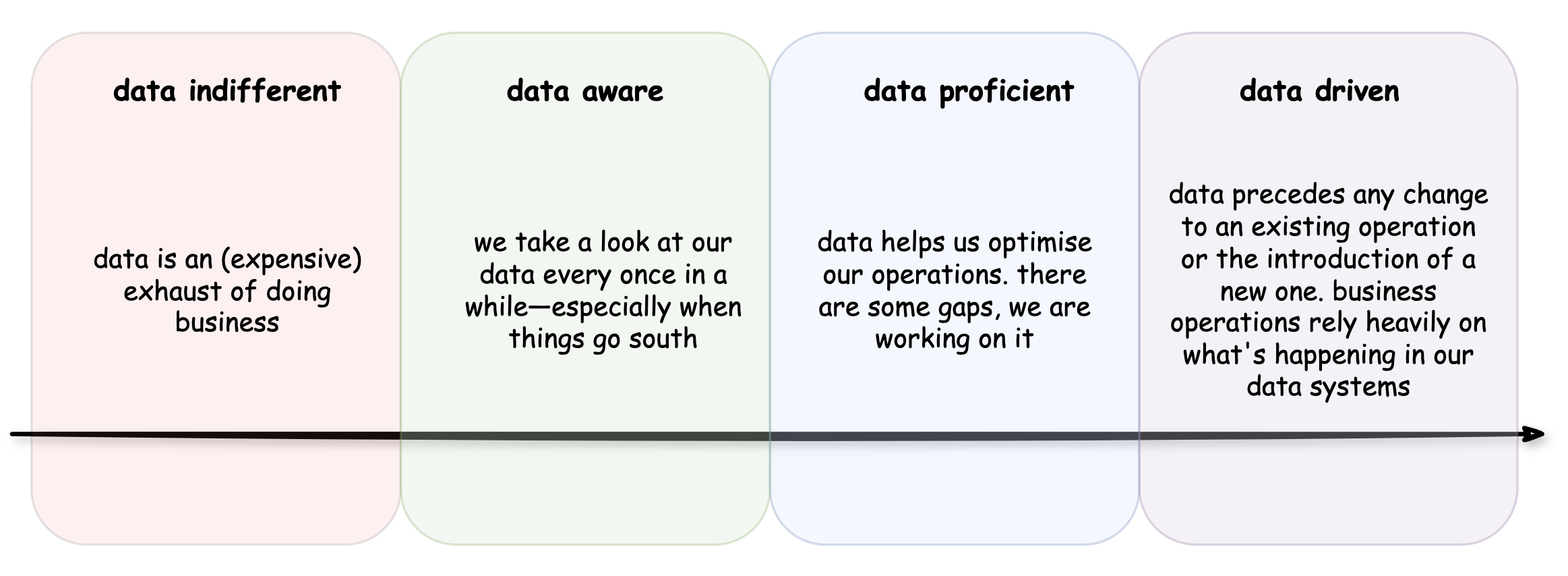The only data maturity scale that matters

It is decidedly useless to know that you score three out of five in data accessibility and cleanliness based on one scale or another. Such ranking tells you nothing about your ability to achieve your business goals with data, which is a core idea of such a lofty concept as data strategy.
There is only one actionable data maturity scale that ever existed. It has been marketed under different methodology labels, but as all the best things in life it is simple and it is free. To make effective use of it—you need to start with a very simple question:
What is my data ROI?
If you approached the question diligently and whole-mindedly, chances are you experienced a little “Aha!” moment, a fleeting insight into what data really is.
Now, with this gentle mental recalibration you are ready to pick a point on the data maturity scale that represents your organisation.

Go ahead. Pen and paper still are the best tools for this.
Levels of data maturity
Now that the internal transformation has taken place there are some technicalities that need to be dealt with to manifest the change into the way your company does business.
Moving up the data maturity scale is a complex endeavour with many dimensions —culture, people, operations and finally technology and tools. It is intentional to put technology and tools in the very end of the list—a good data strategy focuses on the outcomes—not tools and processes. Depending on where you are on the data maturity scale different pieces of the puzzle would require your direct attention. Here is a simple framework for thinking about stages of your data maturity journey.
Data indifferent
On the far left of the data maturity spectrum, are organisations that can be described as ”data indifferent”. It's not that they don’t have data—today virtually every modern business in its operations either relies on or generates some sort of data. However, the data indifferent group treats data as an exhaust of conducting business— it does not register it as a resource. At this stage the biggest added value lies in vocalising, articulating, and recognizing data as a potential resource. Moving any further would do more harm than good.
Data aware
Moving slightly to the right of the spectrum, data aware organisations recognize that there is some data generated by the day—to—day operations. They vaguely understand that some value can be extracted from it, and indeed they turn to it from time to time. However, this is done either in a reactive fashion—as a response to something that has already happened (usually negative) and there is a need to investigate how it came to be. Or they do it to check the "we analysed the data" box, although no one is really sure where this checkbox came from and why it needs to be checked. At this stage, it can already be beneficial to identify relevant data sources, establish clear goals, and develop a systematic proactive approach that would make working with data a part of the already existing business operation or two.
Data proficient
In the next stage of the data maturity journey organisations become intimately aware of the data they have and how it can be used to max out the benefit from the business operations. Intentional investments are made into hiring the right people and setting up the right tooling and data infrastructure. Data silos start disappearing. Data gaps are identified and are being proactively closed by instrumenting corresponding business processes with telemetry capabilities. A separate dat org structures emerges from under the hood of IT. It is at this stage that companies start being able to approach the golden question “What is my data ROI?”
Data driven
Data-driven organisations strategise and build their business around a good feedback loop between what’s happening in their operations and what’s reflected in the data systems. This means that any change to an existing operation or the introduction of a new one begins with either evaluating already-collected data insights or setting up a system to collect data before launching the operation. Data is a valuable asset, and its utilisation offers a clear ROI.
For small, heavily digitised businesses, operating in a data—driven fashion is relatively straightforward. However, it becomes more challenging for larger companies with numerous physical assets and operations. The bigger the company, the more effort needs to be put into aligning different aspects, including culture, people, operations, and finally, technology and tools, to make data—driven operations work seamlessly.
While conducting data maturity assessments, following frameworks, and organising workshops can be helpful, the only true measure that matters is your ability to achieve business goals with data. It is a simple question and you can answer it immediately. And only after realising where you are and where you want to be with respect to data in your company, can you start focusing on the technicalities—80% of which are not technical at all—of making it happen.
